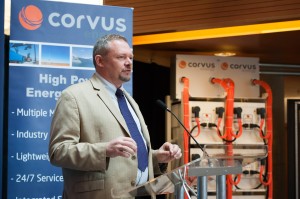VANCOUVER, B.C., CANADA -- April 19, 2013 — A new project designed to make the UBC Point Grey campus electric grid more reliable and efficient will be showcased today during an event that takes place at 10:30 a.m. in The Fred Kaiser Building located at 2332 Main Mall in Vancouver.
 The first multi-location project of its kind in the world, the UBC Living Lab smart micro-grid demonstration will provide operational backup power to three facilities integrated with the grid, renewable energy sources and a mega-Watt energy storage capability. At the event, guests will be to see the potential for integrating this technology into operating electric power grids.
The first multi-location project of its kind in the world, the UBC Living Lab smart micro-grid demonstration will provide operational backup power to three facilities integrated with the grid, renewable energy sources and a mega-Watt energy storage capability. At the event, guests will be to see the potential for integrating this technology into operating electric power grids.
With funding from Natural Resources Canada (NRCan) Corvus Energy, Alpha Technologies and UBC, the permanent, commercial installation will collect ongoing energy storage and use data that will be used to further develop the smart grid utility.
The partners will look at how a smarter grid can help deliver electricity more efficiently, cost-effectively and reliably. The project team will also research, measure and evaluate the impact of stored and distributed energy on the grid and use the facilities as a test bed for product development.
Corvus has committed $1 million to the $5 million project, supplying 154 advanced AT6500 battery modules totaling 1MWh located at three sites on campus: the Bioenergy Research and Demonstration Facility (BRDF), and the Network for Centres of Excellence (NCE) and Fred Kaiser buildings.
“The energy storage technology used for this project allows us to understand how energy is harnessed, stored and deployed at the university to better meets its massive power requirements, which is anticipated to grow by 40 per cent over the next decade,” said Corvus Energy’s CEO Brent Perry. “As a B.C. based company, we are thrilled to be involved with this sustainable city initiative.”
As a key partner, Corvus’ lithium polymer batteries will supply backup power directly to specific loads (whole buildings or individual labs) and communicate with the greater grid, allowing energy from the batteries to interact with the grid when requested and coordinated by Alpha Technologies’ Energy Management System.
“The technologies we are demonstrating, and will help to develop, are fundamental components of improving the electrical energy grid,” said Brent Sauder, UBC’S Director of Strategic Initiatives. “Without these improvements, electricity grids, already strained to near-capacity, will be unable to meet the challenges of the future.
“There is an immediate need for reliable backup power systems on our campus ¾in particular for our BRDF and two research labs,” continued Sauder. “Addressing this operational requirement shows what’s possible today. As a Living Lab project, and with our partners Corvus and Alpha, we will also be developing and demonstrating the solutions needed tomorrow.”
This Living Lab project links the operational needs of the University, the product demonstration and development aspirations of Corvus and Alpha, and the core research and learning mission of the University. At the project scale it will demonstrate the value of integrating the energy storage system into UBC’s electricity grid. More broadly, it demonstrates and sets the foundation to develop technologies with global applicability.
The project’s data collection and analysis efforts are expected to provide an unprecedented view into how smart grid concepts can provide campus-wide benefits while improving the flow of power to and from the grid to meet the university’s future power needs.
Smart grid benefits
Potential benefits of a functional UBC smart grid are manifold. A campus smart grid can:
- better equip UBC’s grid to meet increasing demand
- help governments, utilities and regional populations avoid the cost and expense of overhauling or building new high-power voltage infrastructure
- decrease campus brownouts, blackouts and surges
- lower energy costs
- facilitate real-time troubleshooting
- make renewable power feasible by ensuring energy can be stored safely and distributed consistently where and when it’s needed
- maintain global competitiveness and safeguard UBC’s position at the forefront of the world’s transition toward a clean energy future.
Building the business case
In addition to providing uninterruptible power, Corvus is focused on developing a business case for smart grid¾to show which major infrastructure and technology investments will provide the best value to customers in the long run.
“One of Corvus’ goals of this smart grid installation is to demonstrate the regional cost/benefit analysis,” said Perry. “Understanding the impact of this technology on power usage will validate the business case for governments and utilities.”
Corvus’ advanced energy storage technology has been used in a range of industrial and commercial applications and markets with a system payback that is often less then two years. “Our partnership with Alpha and UBC Living Lab will create opportunities for Corvus to pursue broader smart grid initiatives that meet communities’ rapidly growing energy demands,” added Perry.
About Corvus Energy
Corvus Energy, based in Richmond, B.C., Canada provides industrial-sized power in a compact, modular lithium-ion battery system to commercial marine, transportation, ports machinery, remote community, off grid and grid energy markets. Its revolutionary battery packs have the capacity to output sustained power comparable to diesel engines in hybrid and full-electric vessels and vehicles. For more information, please visit www.corvus-energy.com.
Additional Information (photos, system highlights, about the project) :
www.sustain.ubc.ca
www.corvus-energy.com/project_profile_UBC_living_lab/
www.alpha.ca/livinglab
www.ece.ubc.ca
- 30 -
Media Contact:
Maria LoScerbo
maria@epicpr.ca
604.732.6221

